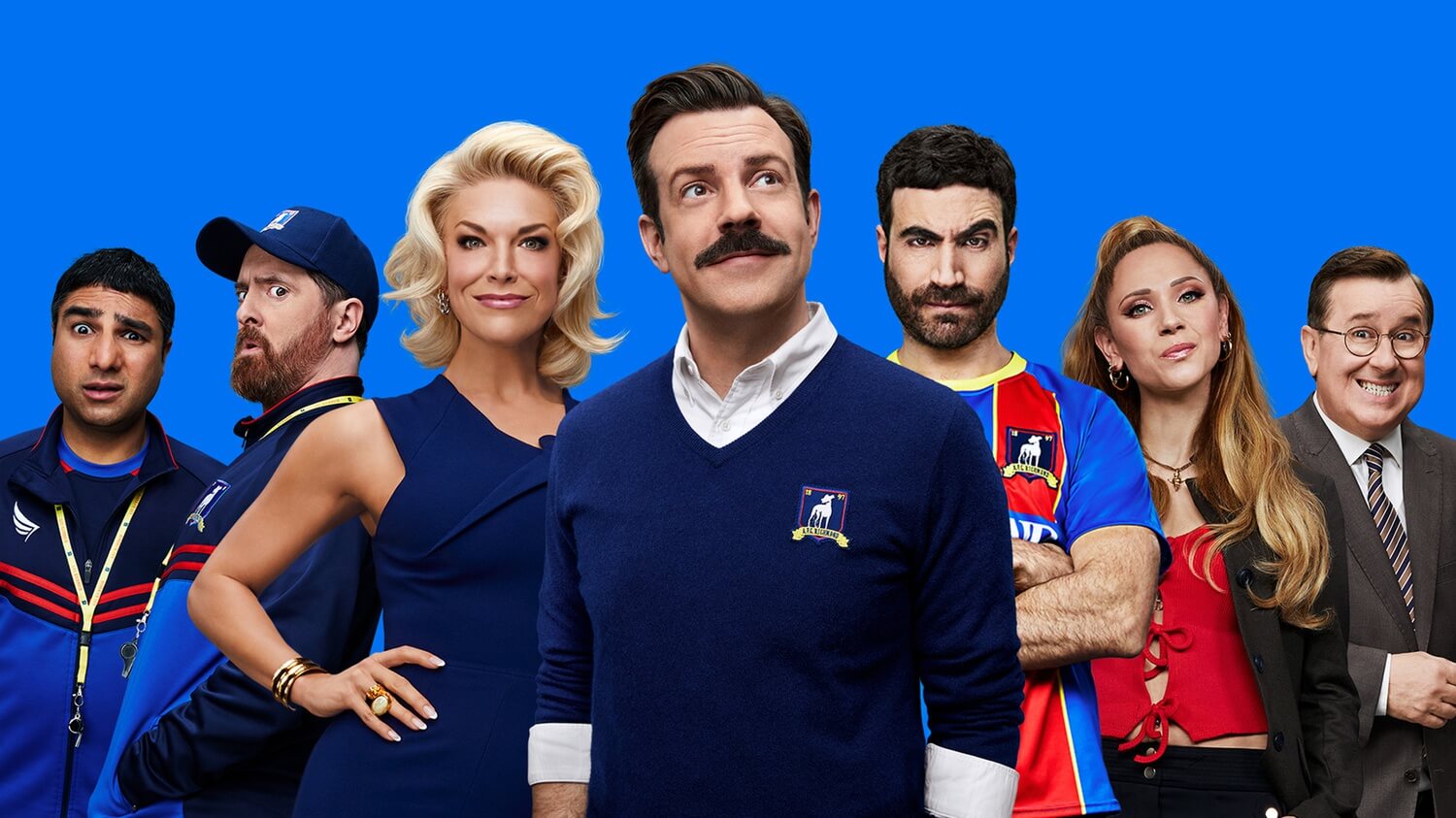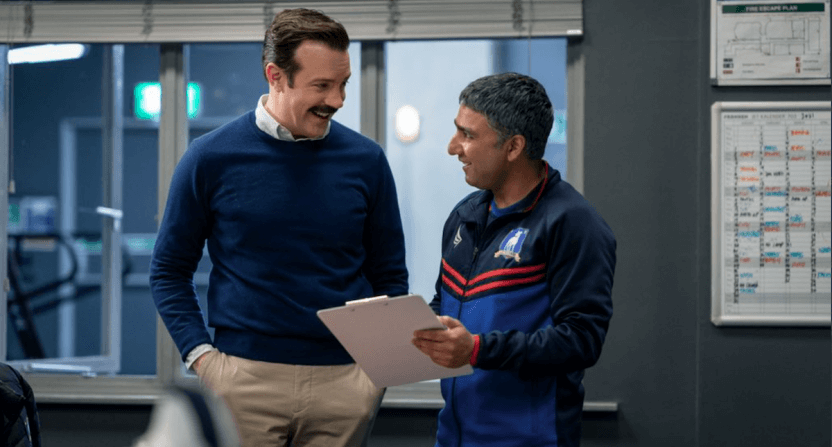Image credit: Apple TV+
 Written by One Love staff member Sheridan Riolo
Written by One Love staff member Sheridan Riolo
Ted Lasso—ever heard of him? Recently, the AppleTV+ series has taken the streaming world by storm and captured the hearts of many. What you need to know: Ted Lasso is a successful college football coach when he is recruited to manage and coach AFC Richmond, prominent soccer—sorry, football—team in the UK.
The show has been commended for its nuanced portrayal of masculinity, hilarious dialogue, and conflict-minimal plotlines (who knew we could be hooked without the drama?). From a One Love perspective, Ted Lasso highlights what we’re all about—the 10 Signs of a Healthy Relationship, plotlines around navigating relationship endings, accessing resources, and even some incredible how to help a friend content (go Higgins!).
What the show highlights best is that like sports, love takes practice. We all do unhealthy things, but Ted and his team are modeling how taking responsibility can and should look when we make a mistake or hurt someone we care about. At One Love, we believe it isn’t enough to apologize—while a genuine “I’m sorry” can go a long way, there are two other essential elements to taking responsibility:
- Ownership: Admitting what you did and why it was wrong (specifics help!).
- Follow-through: Identifying what you can do to change your behavior in the future and putting it into practice—making sure what happened won’t happen again.
**Caution, spoilers ahead**
Examples of Taking Responsibility:
Rebecca Comes Clean
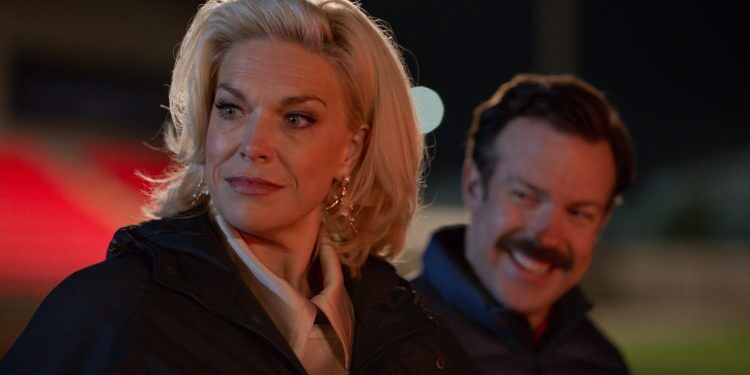
Image credit: Apple TV+
The situation: From the first episode of the series, viewers know Rebecca, owner of AFC Richmond, has hired Ted under false pretenses, hoping he’ll fail and ruin the reputation of her ex-husband’s beloved team. However, as the story unfolds, we see Ted and Rebecca’s friendship growing until her plan is completely derailed.
Ownership: Toward the end of the season, Rebecca comes clean to Ted, admitting to sabotaging him “every chance she had” and apologizing for her behavior.
Follow-through: Throughout the rest of the show, we see Rebecca taking some serious healthy strides in her friendship with Ted and leaving her sabotaging ways behind.
A note on forgiveness: While this is one of the show’s most heartwarming scenes because Ted forgives Rebecca, even empathizing with her that “divorce is hard,” —don’t feel pressured to forgive and forget. Even when someone takes responsibility and apologizes, you’re allowed time and space to process, heal, and decide what comes next. If someone is pressuring you to forgive them before you’re ready or guilting you for taking your time, this may be a sign they aren’t being genuine—or that they don’t respect your boundaries.
Roy Admits He Overreacted
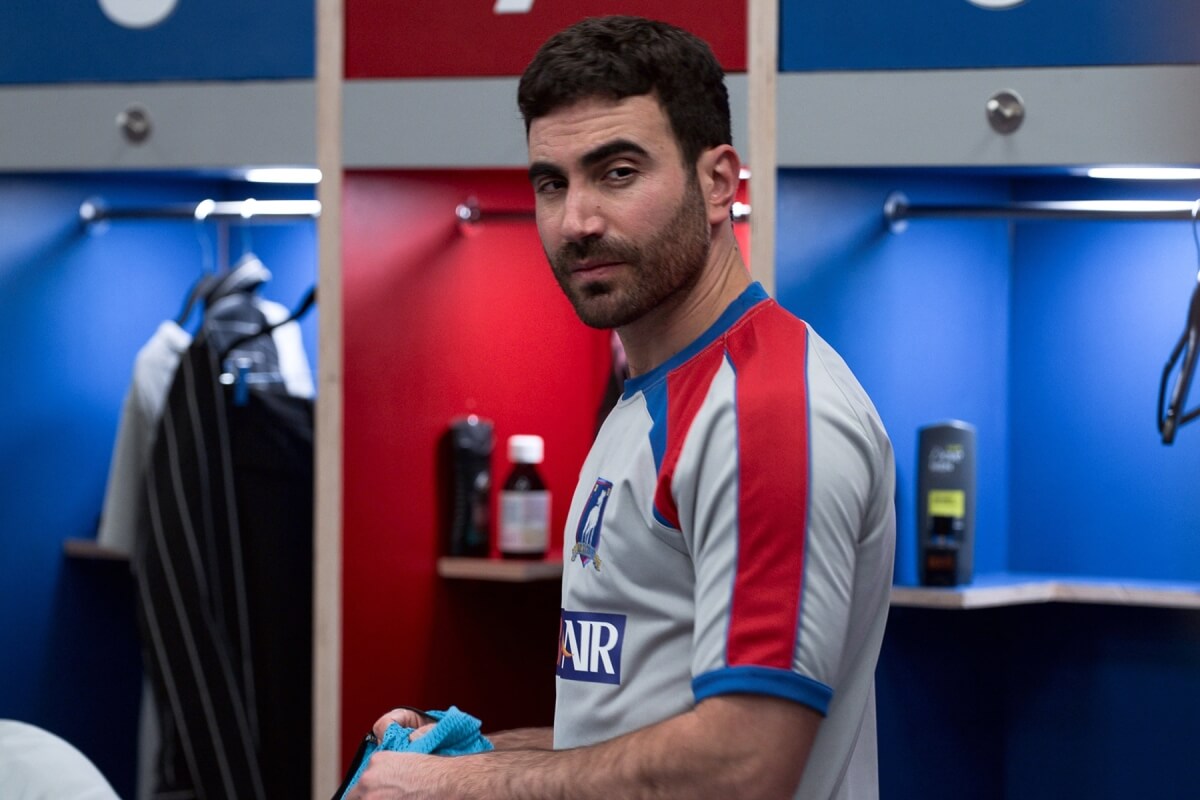
Image credit: Apple TV+
The situation: Roy and Keeley may be the show’s favorite couple, but in the middle of Season 2, we see the intensity of their relationship begin to wear on Keeley. Since they now both work for AFC Richmond, they’re together 24/7—at home, at work, and in their free time—which would make anyone crave some independence from their partner. When Keeley tries to express this to Roy (albeit, not in the calmest way), he reacts explosively and guilts her for venting to her friends about it.
Ownership: When you can’t say it with words, say it with a playlist! Keeley comes home to find that Roy has drawn her a bath and intends to give her some much-needed alone time. He even creates a self-care soundtrack for her, entitled “Roy is Sorry for Not Understanding Keeley.”
Follow-through: After apologizing, Roy tells Keeley she won’t see him “for at least three hours,” which shows he understands her need for space and is willing to change his behavior.
The Silent Treatment™: Following their argument, Roy essentially ignores Keeley. While wanting some time and headspace to work through your feelings is totally justified, remember that there’s a difference between taking space and icing someone out. Before going off the radar, try communicating that need to a partner or friend so it doesn’t feel like a penalty.
Nate Apologizes to Colin
Image credit: Apple TV+
The situation: Former kit manager, now assistant coach, Nate, is succumbing to the simultaneous flattery and pressure of social media after a game-winning coaching decision earned him the nickname Wonder Kid—or wunderkind (depends on who you ask). After Nate excludes Colin from a drill during training, Colin asks Nate if he did something to annoy him or anger him in some way. Nate responds by belittling Colin’s athletic ability in a “weird” and “personal” way, according to Coach Beard.
Ownership: Nate requests airtime during practice to publicly apologize to Colin, using some very…colorful language to describe his behavior (hey, we didn’t write it).
Follow-through: In his apology, Nate promises it “won’t happen again” and that seems to be true! While the show has (hopefully) many seasons to go, we haven’t seen Nate belittle Colin since.
Help a Friend moment: We often talk about starting a conversation with someone who’s on the receiving end of unhealthy behaviors, but what about talking to a person about their unhealthy behavior? When Nate arrives in his office after his conversation with Colin, Coach Beard is waiting. He calls him on his actions, saying, “You were rude to Colin,” and leaves Nate with a simple note of “Do better.” As a friend, coach, teammate, or coworker, it’s our responsibility to hold the people we know and care about to their highest standard.
Jamie Makes Amends
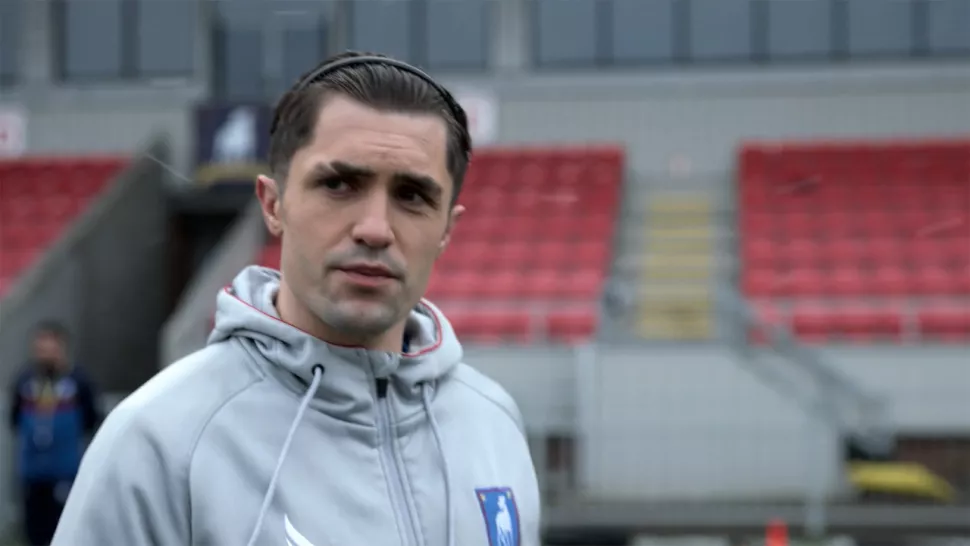
Image credit: Apple TV+
The situation: He’s the young, arrogant star footballer you hate to love—he’s Jamie Tartt (doo- doo-doo-doo-doo). From the beginning of the series, Jamie is a problematic character. He’s an untrustworthy partner, openly demeaning to his teammates, and doesn’t care to understand the concept of teamwork (or kindness, for that matter). When he leaves AFC Richmond in Season 1, it’s good riddance—so it’s no wonder the team is less than thrilled when Ted resigns him in Season 2.
Ownership: On one of his first days back with AFC Richmond, Jamie takes the opportunity to speak to the team in the locker room, admitting he “wasn’t the greatest teammate” and that he did and said some bad things. The other players help him out on the specifics—from calling one of them a “jaundiced worm” to getting them relegated, Jamie’s got a lot to be sorry for. He ends his speech by telling the team he’s ready to do “whatever it takes” to make up for his unhealthy behavior.
Follow-through: While Jamie’s road to redemption may be a long journey, from this scene on he works to show the rest of the team he’s willing to understand and live the value of teamwork. He makes some huge strides by the end of the episode (with a little help from Led Tasso), most notably when he stands in solidarity with Sam and his other Nigerian teammates when they protest the team’s main sponsor, the fictional Dubai Air.
Ted Hears Dr. Fieldstone Out
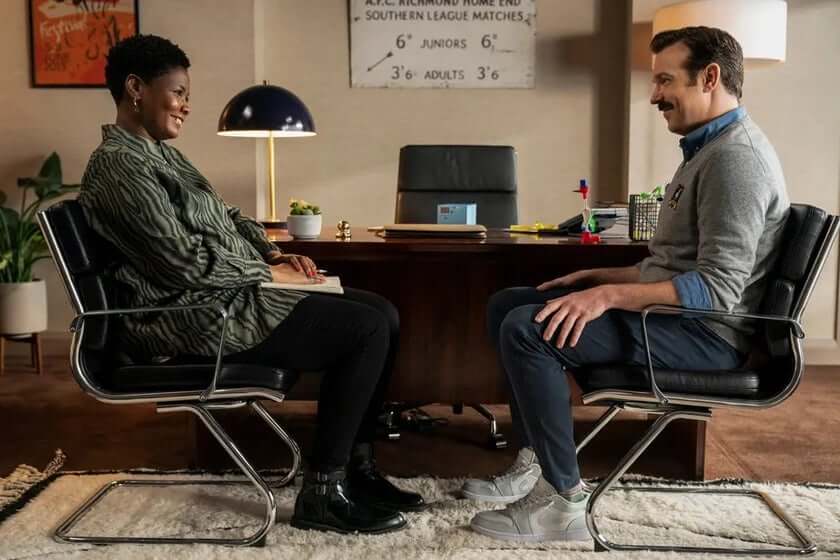
Image credit: Apple TV+
The situation: When Ted begins seeing the team’s sports therapist, Dr. Sharon Fieldstone, it’s clear he’s uncomfortable and mistrusting the therapeutic process. While in session, Ted acts in a volatile way, openly belittling Dr. Fieldstone’s profession before storming out of the room.
Ownership: An important part of owning your unhealthy behavior is listening to the other person to understand how it affected them. When Ted returns for his next session, Dr. Fieldstone tells him he offended her with his insults and asks, if the situation were reversed, how he would feel about her implying the same things about his role as a coach. Ted seems to hear Dr. Fieldstone and apologizes for his behavior.
Follow-through: While we don’t see this conflict fully resolved by the end of the episode, the audience can interpret Ted’s calm and open demeanor as a sign he’s ready to respect Dr. Fieldstone and the process. While more bumps arise as the series unfolds, we don’t see Ted act in the same volatile and belittling way again.
Excuse vs. Reason: We’re not implying that accessing resources is easy. In fact, it can be extremely difficult to admit you need help, and harder still to sit across from someone and recount past harmful experiences. Reactions to trauma vary—you may have heard of fight, flight, and freeze. Luckily, Dr. Fieldstone handled Ted’s response like the pro she is, but keep in mind this sort of reaction can make someone else feel unsafe. While Ted’s trauma may be a reason he reacted the way he did, it is not an excuse for unhealthy behavior that belittles, scares, or intimidates someone else.
To see how One Love’s 10 Signs relates to your favorite pop culture, visit the Education Center for more.
Browse by Category

How to Have Healthy Holiday Conversations with Family (and Prep Your Partner)
The holidays are a time for family, good food, and—let's be real—sometimes intense conversations. Whether it's politics, lifestyle choices, or…
How to End a Summer Romance or Friendship
Summer flings and friendships can feel fleeting. So why is…
Celebrate Your Freedom: Independence in Relationships
As Independence Day rolls around, let’s chat about something just…
Practicing Equality in Your Relationships
Equality is one of One Love’s 10 Signs of a…
How to Practice Allyship Using the 10 Signs
During the month of June the United States observes both…





